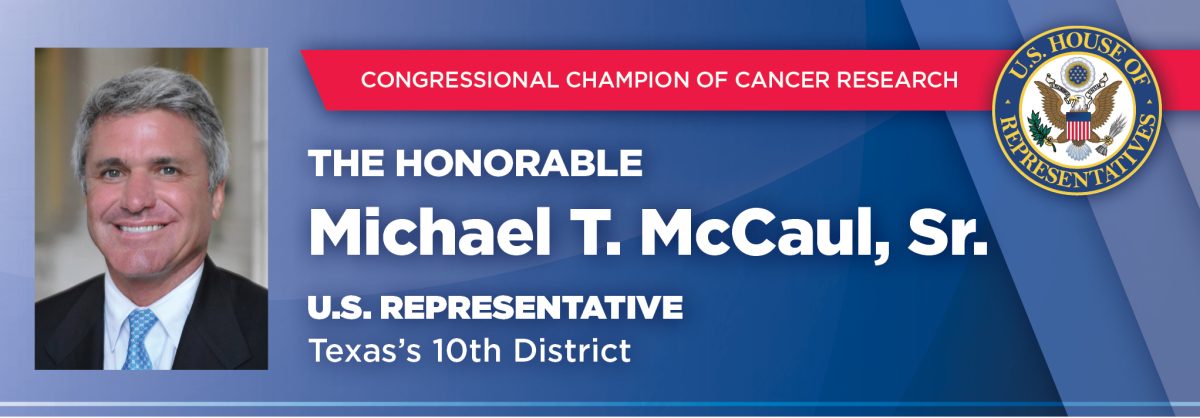The Honorable Michael T. McCaul, Sr.

Since joining Congress, and to honor your childhood friend who passed from cancer, you have been a steadfast advocate about the importance of cancer research. Could you share how your friend’s battle against cancer, and those of others close to you, have influenced your work in Congress?
I was nine years old when I first learned about cancer. My fourth-grade classmate and best friend entered school one day, and I noticed his hair falling out. “I’m really sick,” he told me when I asked what was going on.
One month later, I attended his funeral. That’s when I discovered the devastation cancer can cause. I barely understood how such a thing could happen, but I knew I wanted to keep it from happening to other kids. That’s why I founded the Childhood Cancer Caucus as soon as I joined Congress, with the mission of eliminating cancer as a threat to all children.
How has that personal experience shaped your approach to health policy and the importance of funding for cancer screening, prevention, and research?
Throughout my time in Congress, I’ve gotten to know many brave cancer patients and survivors. They are without a doubt my biggest inspiration. My friend Sadie, for example, was diagnosed with leukemia in 2015 at the age of seven. Since then, she has overcome cancer and gone on to advocate for countless other patients. She and I even wrote a book together about her journey and our work to pass new childhood cancer laws.
Another one of my favorite young fighters is named Sophie. When I first met her—three months before my annual Childhood Cancer summit—she was blind and confined to a wheelchair. But she had the biggest smile and the strongest spirit. Her family enrolled her in natural killer cell therapy, a form of immunotherapy only recently available to children. And when my summit came around just three months later, she could see and walk with support.
Her story is becoming more and more common, as our caucus continues pushing for increased research and new treatments to be made available for children. In fact, Sophie’s form of immunotherapy was made possible by a clinical trial at M.D. Anderson that used the voucher system established by my Creating Hope Act. Once you see these life-changing results right in front of your eyes, it’s impossible not to fight for more funding, research, and treatments for other patients.
What is your message to the scientists and physicians working to make progress against cancer?
Keep going! Today’s research and innovation are leading to exciting possibilities, ranging from new cancer vaccines to natural killer cell therapy.
I recently met with a beautiful little girl named Ailani, who is fighting a rare form of leukemia (although you wouldn’t know it from looking at her radiant smile). Ailani is enrolled in a clinical trial for a CAR T-cell therapy that her parents tell me would have been unthinkable just last decade.
Given the incredible advances being made at hospitals and research facilities across the country—including M.D. Anderson and Texas Children’s in my home state—I am extremely optimistic about what the future holds. Just ten years ago, we couldn’t have imagined the victories we would be seeing in the cancer space today. I am confident that in another ten years, we’ll be able to say the same.
Which policy priorities or legislative efforts do you share that would fuel better prevention, detection, and treatment of cancer?
I’m proud to have introduced and passed several bills that I believe are changing the landscape of childhood cancer research and innovation. The STAR Act, for example—the most comprehensive childhood cancer bill ever written—improves cancer surveillance, expands research, and provides resources to survivors. It has already been reauthorized for the next several years, and I hope Congress continues to authorize and fund this important initiative for years to come.
This session, I’m continuing to champion legislation titled the Give Kids a Chance Act. This bill would build on my RACE for Children Act, which directs drug manufacturers producing adult cancer drugs to study those same drugs for children. Since RACE was signed into law in 2017, there have already been 32 pediatric studies. However, children with relapsed cancer are rarely cured by one-drug treatments because their cancers are so advanced. And while thousands of successful drug combination therapies are now being studied and developed for adults, the FDA has only authorized pediatric cancer trials of single drugs. The Give Kids a Chance Act would authorize the FDA to direct companies to study combination drugs and therapies in pediatric trials as well. I’ll never stop fighting to give both children and adults every opportunity to beat cancer.